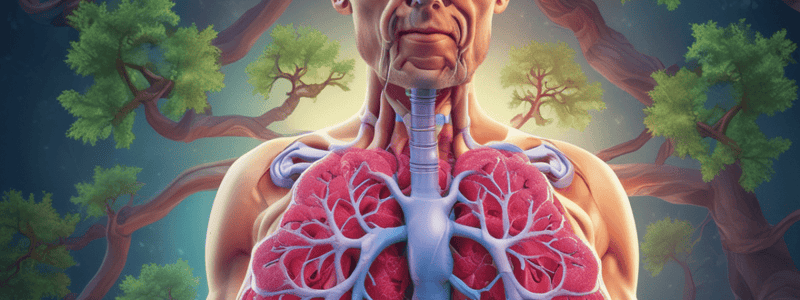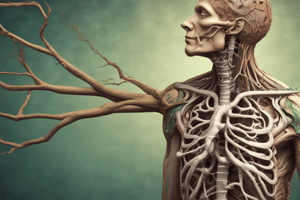Podcast
Questions and Answers
What is the primary function of the bronchial tree and bronchioles?
What is the primary function of the bronchial tree and bronchioles?
- To reduce friction between the visceral and parietal pleurae
- To secrete surfactant
- To carry air into and out of the pulmonary alveoli during breathing (correct)
- To facilitate alveolar gas exchange
What is the role of surfactant in the pulmonary alveoli?
What is the role of surfactant in the pulmonary alveoli?
- To aid in the diffusion of oxygen and carbon dioxide
- To prevent pulmonary alveolar collapse during exhalation
- To reduce the surface tension between water molecules
- All of the above (correct)
What is the approximate surface area of the lungs?
What is the approximate surface area of the lungs?
- Two layers of serous membranes called pleurae
- 5,800 ml
- 300 million pulmonary alveoli per lung
- 75 m^2 (correct)
How many lobes are in the left and right lungs?
How many lobes are in the left and right lungs?
What is the purpose of the pleural fluid in the pleural cavity?
What is the purpose of the pleural fluid in the pleural cavity?
What is the primary function of the pulmonary alveoli within the respiratory system?
What is the primary function of the pulmonary alveoli within the respiratory system?
Which structure in the respiratory system is specifically involved in the movement of air into and out of the lungs?
Which structure in the respiratory system is specifically involved in the movement of air into and out of the lungs?
What is the main function of the bronchioles in the respiratory system?
What is the main function of the bronchioles in the respiratory system?
Which part of the respiratory system is primarily responsible for regulating blood pH?
Which part of the respiratory system is primarily responsible for regulating blood pH?
Among the following, which structure plays a key role in exchanging oxygen and carbon dioxide between the blood and tissues?
Among the following, which structure plays a key role in exchanging oxygen and carbon dioxide between the blood and tissues?
What type of muscle tissue aids in regulating airflow in bronchioles?
What type of muscle tissue aids in regulating airflow in bronchioles?
Which type of epithelium lines the bronchioles?
Which type of epithelium lines the bronchioles?
What is the main function of beating cilia in the respiratory system?
What is the main function of beating cilia in the respiratory system?
What is the purpose of the cartilaginous rings in the bronchial walls?
What is the purpose of the cartilaginous rings in the bronchial walls?
Which structure branches from the smallest bronchioles and terminates in tiny air sacs?
Which structure branches from the smallest bronchioles and terminates in tiny air sacs?
What is the primary function of the epiglottis?
What is the primary function of the epiglottis?
What is the role of the vestibular folds (false vocal cords) in the larynx?
What is the role of the vestibular folds (false vocal cords) in the larynx?
What is the primary function of the tracheal cartilages?
What is the primary function of the tracheal cartilages?
What occurs in the larynx during the swallowing process?
What occurs in the larynx during the swallowing process?
What is the primary function of the trachea?
What is the primary function of the trachea?
What is the primary function of the serous membranes in the respiratory system?
What is the primary function of the serous membranes in the respiratory system?
What is the primary role of the pulmonary alveoli in gas exchange?
What is the primary role of the pulmonary alveoli in gas exchange?
What is the primary function of the bronchial tree in the respiratory system?
What is the primary function of the bronchial tree in the respiratory system?
What is the primary role of the bronchioles in the respiratory system?
What is the primary role of the bronchioles in the respiratory system?
What is the primary function of the lungs in the respiratory system?
What is the primary function of the lungs in the respiratory system?
What is the function of the olfactory mucosa in the nasal cavity?
What is the function of the olfactory mucosa in the nasal cavity?
Which cells in the respiratory mucosa produce mucus to moisten incoming air?
Which cells in the respiratory mucosa produce mucus to moisten incoming air?
What is the role of cilia in the respiratory mucosa of the nasal cavity?
What is the role of cilia in the respiratory mucosa of the nasal cavity?
Where does the destruction of trapped particles by gastric juice occur?
Where does the destruction of trapped particles by gastric juice occur?
Which structure divides the nasal cavity into right and left portions?
Which structure divides the nasal cavity into right and left portions?
What is the role of the palate in relation to the nasal cavity?
What is the role of the palate in relation to the nasal cavity?
Where does the respiratory mucosa line in addition to the nasal cavity?
Where does the respiratory mucosa line in addition to the nasal cavity?
Which part of the nasal cavity contains three nasal conchae projecting from lateral walls?
Which part of the nasal cavity contains three nasal conchae projecting from lateral walls?
Which cells are found in the epithelium of the nasal cavity's respiratory mucosa?
Which cells are found in the epithelium of the nasal cavity's respiratory mucosa?
During inhalation, which pressure is lower than atmospheric pressure?
During inhalation, which pressure is lower than atmospheric pressure?
What is the function of intrapleural pressure during breathing?
What is the function of intrapleural pressure during breathing?
Which structure is responsible for exchanging gases between the air and the blood in the respiratory system?
Which structure is responsible for exchanging gases between the air and the blood in the respiratory system?
What would happen if intrapleural pressure equaled atmospheric pressure?
What would happen if intrapleural pressure equaled atmospheric pressure?
How does air move during breathing according to pressure gradients?
How does air move during breathing according to pressure gradients?
Flashcards are hidden until you start studying
Study Notes
Respiratory System
- The primary role of the respiratory system is to supply the blood with oxygen and remove carbon dioxide from the blood.
Processes of Respiration
- Five processes involved in respiration:
- Breathing (movement of air into and out of the lungs)
- Alveolar gas exchange (exchange of O2 and CO2 between air in pulmonary alveoli and blood in alveolar capillaries)
- Gas transport
- Systemic gas exchange (transport of O2 and CO2 between blood in systemic capillaries and tissues)
- Aerobic respiration (use of O2 and production of CO2 during ATP production)
Functions of the Respiratory System
- In addition to gas exchange, the respiratory system is responsible for:
- Detecting odors
- Producing sound
- Regulating blood pH
Larynx
- Functions:
- Passageway for air
- Produces sound through vocal cords
- Structures:
- Epiglottis (cartilaginous flap that keeps solids and liquids from entering the larynx)
- Vocal folds (cords)
- Glottis (vocal folds and the space between them)
- Vestibular folds (false vocal cords)
Trachea
- Airway that extends from the larynx into the thoracic cavity
- Branches to form right and left main bronchi
- C-shaped tracheal cartilages support the trachea
- Inner wall lined by respiratory mucosa
Bronchi, Bronchioles, and Pulmonary Alveoli
- Primary function: to carry air into and out of the pulmonary alveoli during breathing
- Type I: site of alveolar gas exchange
- Type II: filled with watery fluid to aid diffusion, and produce surfactant to prevent pulmonary alveolar collapse
- Surfactant: a mixture of lipoproteins secreted by great (type II) alveolar cells
- Approx. 300 million pulmonary alveoli per lung, with a surface area of approx. 75 m2 and holding approx. 5,800 ml of air
Lungs
- Cone-shaped, separated by the mediastinum
- Consists of pulmonary alveoli, air passageways, blood and lymphatic vessels, nerves, and connective tissues
- Divided into lobes: left lung has two lobes, right lung has three lobes
- Two layers of serous membranes called pleurae surround each lung
- Pleural cavity: space between the visceral and parietal pleurae, filled with pleural fluid
Subdivisions of Respiratory System
- Upper respiratory tract: nose and pharynx
- Lower respiratory tract: larynx, trachea, bronchi, and lungs
Nose
- Functions:
- Warms, humidifies, and filters incoming air
- Detects odors
- Structures:
- Nasal bones support the nose bridge
- Nasal septum divides the nasal cavity into right and left portions
- Palate separates the nasal cavity from the oral cavity
- Olfactory mucosa: mucous membrane containing the olfactory epithelium
- Respiratory mucosa: mucous membrane containing pseudostratified ciliated columnar epithelium
Breathing
- Process of exchanging air between the atmosphere and pulmonary alveoli
- Air moves along an air pressure gradient
- Three pressures important to breathing: atmospheric pressure, intra-alveolar pressure, intrapleural pressure
Inspiration
- Process of moving air into the lungs
- Intra-alveolar pressure < atmospheric pressure allows for air to flow from the higher air pressure in the atmosphere toward the lower air pressure within the lungs
- Contraction of the diaphragm and external intercostal muscles causes an increase in lung volume and decrease in intra-alveolar pressure
Studying That Suits You
Use AI to generate personalized quizzes and flashcards to suit your learning preferences.




